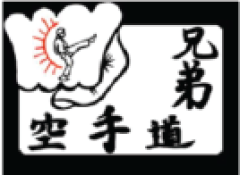Dojo Rules
- •At all times display good manners in the dojo.
- •Bow and say “oss” strongly upon entering and leaving the dojo.
- •Always bow to a higher rank.
- •Bring a combination lock for your locker and remove it daily.
- •Smoking, alcohol, and food are prohibited in the dojo.
- •Only bare feet are allowed in the training areas.
- •Always call your instructor Sensei or the appropriate title.
- •At all times treat people with respect.
- •All students must help to keep the dojo clean.
- •Use good personal hygiene and a clean Karate Gi.
Karate Dojo Kun
The Dojo Kun is a Japanese martial arts term literally meaning (training hall) rules. It outlines behavior expected and disallowed.
At Kyodai every discipline has their own Dojo Kun and it is recited at the end of each class.
Principles of the Dojo:
To seek perfection of character.
To be sincere and honest.
To show strong spirit.
To practice courtesy.
To control bad temper.
Principles of Kempo Kung-Fu:
A student must practice without interruption.
A student must be kind, honest, and friendly to fellow students.
A student must not be aggressive, greedy, or boastful.
A student must not be quarrelsome.
Courtesy and prudence must be shown to all teachers, elders, and ancestors.
Chuan Fa Shaolin Kempo Kung-Fu must only be used for legitimate self-defense.
The art must not be shown to commoners.
-Monk Chen Yuen
At Kyodai, we live by these precepts. Memorize them, think about them, and follow them – even if you do not fully understand them. Time and hard work yield understanding. By following the Dojo Kun you will begin to understand yourself and others better, thereby making you a better karate student. Master Gichin Funakoshi asserted:
“The ultimate aim of the art of karate lies not in victory or defeat, but in the perfection of character of its participants.”
-Gichin Funakoshi
Our own Shihan Aschkar, reflecting upon his experiences, has this insight on how understanding is gained in the world of martial arts:
“If you are driven to be good in the martial arts, you will be guided without knowing you are guided and what you have gone through and learned. You may arrive at a high level of understanding without initially knowing how you got there.”
–Shihan Aschkar
